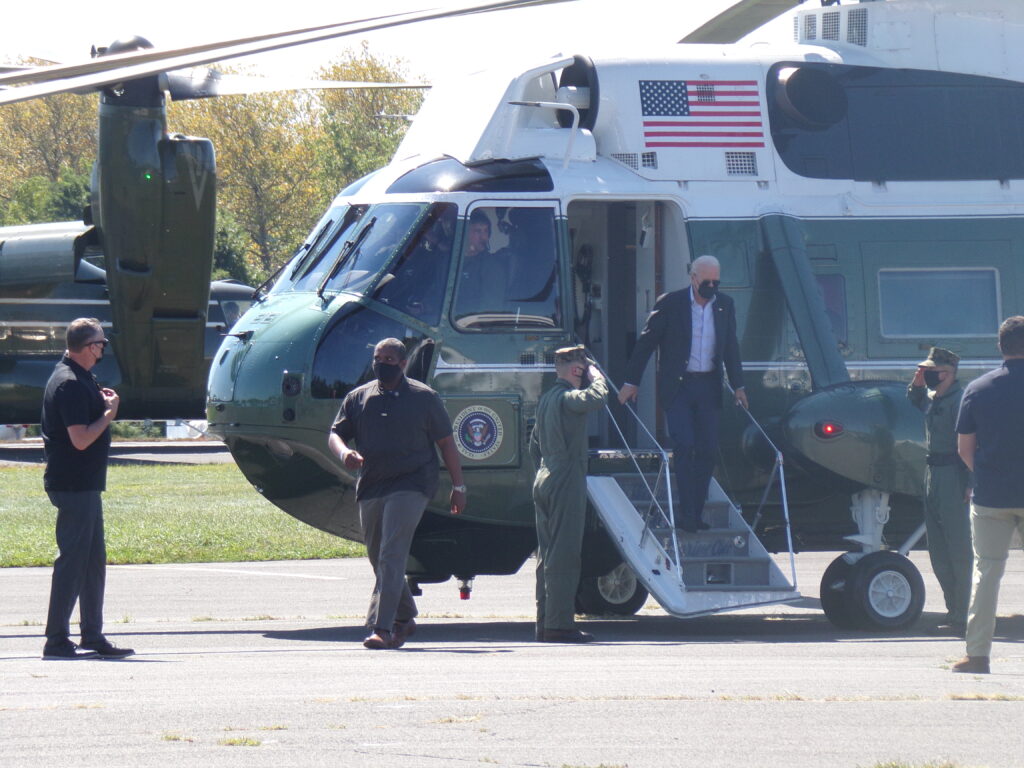
Historically, New Jersey’s relatively late place in the Presidential primary campaign cycle has been relegated to footnote status. This year is shaping up to be very different even though President Biden has already secured the delegates for his nomination in Chicago in August.
There’s the blowback to Governor Murphy’s insistence on seeing his wife Tammy in the U.S. Senate. Then there’s the widening disgust over Sen. Bob Menendez’s continuing to hang around after his third indictment as well as the growing movement for a ceasefire in Gaza that’s finding expression in the “uncommitted” preference in the June 4th presidential primary.
Last month, in the Michigan Democratic primary the protest vote by over 100,000 voters out of the 618,000 ballots cast was sufficient for peace activists to secure two delegates to the Democratic Convention. Organizers , which includes Michigan’s growing politically active Arab and Palestinian communities, had set a goal of just 10,000 votes.
Earlier this month, on Super Tuesday cease fire motivated voters in North Carolina, Massachusetts, Colorado and Minnesota to cast 263,000 “non-committed” protest ballots. In Minnesota close to 46,000 non-committed votes translated into five delegates.
Here in New Jersey a grassroots movement linked to progressive groups like New Jersey Democratic Socialists of America are busy circulating petitions for the delegate slots for the state’s 20 districts. All in all, primary voters will select 42 men and 42 women and eight alternates that will make up most of the 146 delegates and 11 alternates that will go to Chicago this summer.
The deadline is March 25 at 4 p.m. May 14th is the deadline to vote in the June primary. In New Jersey, unaffiliated voters can opt to vote in a party primary on the day of the election. Voters who have already expressed a party preference have 55 days before the primary to switch their allegiances.
During a recent interview, Celinda Lake, a top Democratic Party pollster who worked for the Biden campaign in 2020, warned that Democrats faced “a real turnout problem” among “progressives with a serious erosion of enthusiasm among some of the base voters including young people.”
Former Assembly Member Sadaf Jaffer, who teaches at Princeton University, was the first Asian American and Muslim woman to be elected as a mayor in the country. Jaffer told InsiderNJ that she believes that the “uncommitted” movement, driven by progressive younger voters, has already had an impact on how the Biden administration navigates Israel’s invasion of Gaza after the massacre of over 1,300 Israeli civilians on Oct. 7.
Israel’s prolonged military action has already claimed more than 30,000 lives in Gaza. UNICEF estimates 13,000 children have been killed during the Israeli offensive.
“Vice President Kamala Harris used the words cease fire for the first time the day after the Michigan primary and soon thereafter President Biden started using the work cease fire—maybe not in the same way that those of us who have been calling for a cease fire because we want a lasting cease fire not just temporary pauses,” Jaffer told InsiderNJ. “I think it is certainly noteworthy that Sen. Schumer (D-NY) who had defended Israel and been very unwilling to concede Israel is doing anything wrong, has started to say that, yes—things are not being done properly and he is especially laying the blame on Netanyahu.”
Last week, Sen. Schumer, historically one of Israel’s staunchest partisan, said for Israel “a new election is the only way to allow for a healthy and open decision-making process about the future of Israel, at a time when so many Israelis have lost their confidence in the vision and direction of their government.”.
“And now, as a result of these inflamed tensions in both the Israeli and Palestinian communities, people on all sides of this war are turning away from a two-state solution — including Israel’s Prime Minister Benjamin Netanyahu, who in recent weeks has said out loud repeatedly what many have long suspected by outright rejecting the idea of Palestinian statehood and sovereignty,” Sen. Schumer said in his pointed address from the U.S. Senate floor. “As the highest-ranking Jewish elected official in our government, and a staunch defender of Israel, I rise today to say unequivocally: This is a grave mistake. For Israel. For Palestinians. For the region and the world.”
Renee Steinhagen is the executive director at New Jersey Appleseed, a non-profit public interest law center that works in several advocacy areas including on empowering voters and protecting voting rights.
“New Jersey Appleseed supports vibrant, multi-candidate elections where voters have a choice. Unfortunately, this year, the Democratic Party decided that it would not hold a contested primary, so some of their members are frustrated that there are no candidates opposing Joe Biden, who would take different positions than him on some major issues, such as the Israeli/Palestinian conflict,” Steinhagen wrote InsiderNJ. “Members who believe that Joe Biden does not represent their interests on this life or death issue must have their voices heard and organizing a campaign to elect ‘Uncommitted” delegates who are committed to a permanent ceasefire is an appropriate way to have their voices heard.”
There’s been several articles suggesting there’s an historical parallel between this year’s election and the tumultuous 1968 presidential campaign when the country was sharply divided over the prosecution of the Vietnam War. Tensions exploded in late August of 1968 when the Chicago Police clubbed and beat anti-Vietnam War protestors outside the Democratic National Convention that would nominate Vice President Hubert Humphrey over Sen. Eugene McCarthy, the peace candidate.
On June 5 1968, Sen. Robert Kennedy was shot after he made his victory speech having prevailed in the pivotal California primary. That same night, in the New Jersey primary, Kennedy came in second place, 1,300 votes behind McCarthy, but ahead of Humphrey. Of the 12 primaries that year, McCarthy won seven, Kennedy prevailed in five and Humphrey struck out.
Humphrey had only gotten 66,463 votes, or 2.2 percent of the millions of votes cast in that primary cycle as compared to McCarthy who garnered close to three million as compared to Kennedy’s 2.3 million.
“Road to Chicago’s 2024 Democratic Convention looks a bit like 1968,” John Vukmirovich posited in the Chicago Sun Times. “We are a nation of movements, with a new generation advocating for Black Lives Matter, defunding the police, LGBTQ+issues, abortion rights and anti-gun legislation. On the other side are polar opposites.”
That was written in August, months before the Oct. 7th Hamas attack and Israel’s siege of Gaza that’s ongoing.
(Visited 83 times, 83 visits today)
As an Insider in New Jersey, it is important to stay informed about global events and how they may impact our world. One such comparison that has been drawing attention is the similarities between Vietnam in 1968 and Gaza in 2024.
In 1968, the Vietnam War was in full swing, with the United States heavily involved in combat operations against the North Vietnamese forces. The war was highly controversial, with many Americans protesting against US involvement and calling for an end to the conflict. The violence and destruction in Vietnam during this time were well-documented, with devastating consequences for both the Vietnamese people and American soldiers.
Fast forward to 2024, and the situation in Gaza bears some striking similarities to Vietnam in 1968. Gaza has been a hotspot of conflict for decades, with ongoing tensions between Israel and Palestinian militants leading to frequent outbreaks of violence. The region has been the site of numerous wars and military operations, resulting in widespread destruction and loss of life.
Both Vietnam in 1968 and Gaza in 2024 are examples of how conflict can have devastating consequences for civilian populations. The toll of war on innocent people is immense, with families torn apart, homes destroyed, and lives shattered. The images of suffering and destruction from both Vietnam and Gaza serve as a stark reminder of the human cost of war.
As an Insider in New Jersey, it is important to be aware of these global issues and to advocate for peace and diplomacy as a means of resolving conflicts. By staying informed and engaged with the world around us, we can work towards a more peaceful and just future for all.



